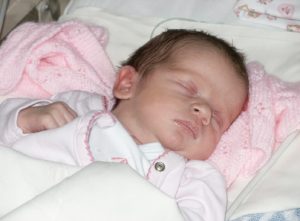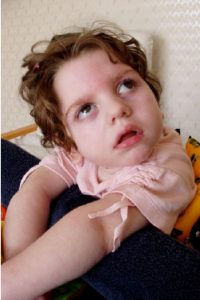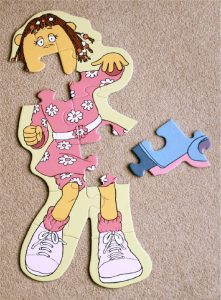The second of the guest posts on the theme of pain and suffering comes from Nigel Freestone. Nigel is the Dad of a friend of ours (Matt) and wrote this a few years back about his granddaughter Abby. We met Matt & Nix and their family 5 years ago and they have become good friends of ours. Although we never met Abby we have been inspired and humbled by how Abby is still a big part of their lives. The way they talk of her, her illness and her part in their lives, is simply inspiring.
Even If He Never Tells Me Why
Once or twice in during Abigail’s little life my wife Ronnie and I were asked by our church to say something about how Abby’s condition affected us and our family. What follows is largely my story, in my words. But while different family members would use different words and examples I believe they would each reach very much the same conclusion. To that extent therefore, this is also their story. I’ve called it Even If He Never Tells Me Why.
I want to start with a brief story. One that impressed itself on me many years ago, long before I realised that it might ever have any relevance for me. My parents were missionaries in the Belgian Congo. They left that country in 1960, just as the civil war surrounding that country’s move to independence began. But they had a friend and colleague who stayed behind to continue her work. Her name was Dr Helen Rosevere. One day the mission station where she was working was overrun by rebel Congolese troops. Among the many atrocities that happened that day, Dr Rosevere herself was severely beaten and gang raped. In the weeks and months afterwards Dr Rosevere says she asked God “Why Lord? Why did this happen?”. She wrote later that she started to come to terms with those horrific events when she felt that God was asking her “Helen, can you thank Me for trusting you with this experience – even if I never tell you why?”.
I have three photos I would like to show you.
 This is my granddaughter Abigail, and this is my favourite picture of her. But I have to tell you that the picture is a lie. Abby was born two weeks early after some kind of trauma in the womb. She was severely brain damaged, had cerebral palsy and epileptic fits. She was blind. Even when this picture was taken early in her life we knew there was something seriously wrong. She didn’t have a proper swallow reflex and had to be fed through a plastic tube into her stomach, via her nose. The tube was secured to her cheek with sticking plaster. The picture is a lie because I have manipulated the photo on my computer, to remove the tube and the plaster. It’s a lie because it is how I wished her to be, not how she really was.
This is my granddaughter Abigail, and this is my favourite picture of her. But I have to tell you that the picture is a lie. Abby was born two weeks early after some kind of trauma in the womb. She was severely brain damaged, had cerebral palsy and epileptic fits. She was blind. Even when this picture was taken early in her life we knew there was something seriously wrong. She didn’t have a proper swallow reflex and had to be fed through a plastic tube into her stomach, via her nose. The tube was secured to her cheek with sticking plaster. The picture is a lie because I have manipulated the photo on my computer, to remove the tube and the plaster. It’s a lie because it is how I wished her to be, not how she really was.
 This is a photo of Abby a few years later. We can tell you a number of things she did, most of which you would probably not have noticed, they were so slight. Yet we rejoiced over every little item of progress she made. Abby mostly existed in the calm eye of what was, at times, a hurricane of pain. Under the regime of the drugs she was given Abby was mostly comfortable and peaceful, she didn’t know any different. But around her, her parents Matt and Nix bore the force of the pain and strain day by day. They faced the difficulties of bringing up a disabled child, watching other people’s children develop and progress, crawl and smile and laugh, when your own child does not. We cried not only for our own pain, and Abby’s, but theirs too.
This is a photo of Abby a few years later. We can tell you a number of things she did, most of which you would probably not have noticed, they were so slight. Yet we rejoiced over every little item of progress she made. Abby mostly existed in the calm eye of what was, at times, a hurricane of pain. Under the regime of the drugs she was given Abby was mostly comfortable and peaceful, she didn’t know any different. But around her, her parents Matt and Nix bore the force of the pain and strain day by day. They faced the difficulties of bringing up a disabled child, watching other people’s children develop and progress, crawl and smile and laugh, when your own child does not. We cried not only for our own pain, and Abby’s, but theirs too.
Abby has been, indeed perhaps still is, a severe test of faith. At one stage Matt gave up leading worship at their church. They have asked – we have asked – where is God in all this? Why doesn’t he answer? Why doesn’t he care? Different members of the family were often at different places spiritually over Abby. When one was strong, or stable, someone else was weak and despairing. One day’s emotions are not necessarily those of the day before, or the next.
 Finally, here is another picture. It’s of Fizz, one of the Tweenies, a children’s television character, also available in jigsaw. The idea came to me one day when I was clearing up the children’s toys. It seems to describe me quite well. Let me highlight for you three things in this picture.
Finally, here is another picture. It’s of Fizz, one of the Tweenies, a children’s television character, also available in jigsaw. The idea came to me one day when I was clearing up the children’s toys. It seems to describe me quite well. Let me highlight for you three things in this picture.
In amongst a mostly pink jigsaw puzzle there is a bright blue piece. It’s the wrong colour, the wrong shape. It doesn’t fit. It doesn’t belong here. This is our Abigail piece. We don’t know where, or how, she fits. We haven’t got answers and it doesn’t make sense. “Why? Lord, Why?”. Yet just as in reality we know that blue jigsaw piece belongs to another Tweenie character puzzle, we expect that one day, when we see the whole picture, perhaps then we’ll understand where Abigail fits.
We try to make Abby fit because we have a number of pieces of our own faith-puzzles missing anyway, just as there are some pieces of this jigsaw puzzle missing. When it comes to even simple matters of faith and understanding God, even after 40 years in my case, we still don’t have all the answers, all the ends tied, everything neatly sorted.
But I cannot allow myself (or you) to miss the third thing in this picture. Here is a recognisable, albeit incomplete, picture of Fizz. There is a temptation to say the puzzle is all rubbish, to behave like a three year old and kick it across the floor in temper and forget it. And yet there are pieces that do fit, pieces that do make sense, a pattern that is understandable, logical, reliable, one piece joined to another. Our faith and Christian experience is like that too. Despite our rogue piece, and our missing pieces, much of it does make sense, it is logical and trustworthy. We know a God who loves us; we have a Bible that can be relied upon; experience of answered (as well as unanswered) prayer. We have a Saviour who died to deal with our sin, and rose again from the dead. We belong to a church, universal as well as local, which loves us and supports us and encourages us to keep going – and where we can sometimes do the same for others.
There may be good reasons to throw it all away, like a broken mixed up jigsaw. We still keep on asking for insight, for understanding, for strength for ourselves and our loved ones for today and tomorrow, for answers to “Why? Lord Why?”. But we choose to believe there is a bigger picture we cannot yet see. Where is God in all this? At the very least he is in the love and care of his people. So, we choose to go on, holding on to what does make sense, to what we have found to be true, to the pieces that do fit, ever thankful to God for giving us Abby – even if He never tells us why.
 Nigel Freestone (Written in March 2007)
Nigel Freestone (Written in March 2007)
Nigel is a 67 year old husband to Ronnie, a father of three and grandfather of ten. He works as a computer programmer for a local firm of solicitors and is a Baptist lay preacher. He lives in Charlton, south east London.
…oo0O0oo…
Our daughter Abigail defied the doctors’ bleak outlook many times but died from a severe chest infection brought about by chicken pox in March 2007, aged just three and a half. We give thanks for the joy and compassion she brought to our family, and she taught us all a great deal without ever saying a word. And when the pieces of the puzzle don’t seem to fit on that difficult road marked with suffering, we still say ‘Blessed be Your Name’.


4 Comments
ukviewer
June 15, 2015 at 8:24 amAbbie’s story is a powerful testimony to God’s love. Because that love showed through the family who might have abandoned her, but with love welcomed and embraced her, despite all of her suffering and their suffering through overstretched compassion and love.
The thing that shines through here for me is ‘faithfulness’ to a God, who could be mistaken as either, cruel, unfeeling or even absent. Faithfulness, not of the unquestioning kind, but of the ‘why’ kind, not understanding, but accepting that all is in God’s hands and knowing that Abbie’s problems were always too serious to be reversed, but hoping that somehow, she would be still able to have a fulfilling life.
Last week, Rachel, a Priest who has Cerebal palsy herself, came to our Deanery Synod to talk to us about disability and how the church can be accepting of others, no matter how different they are from us. She pointed out that she knew that she was ‘whole’ in God’s eyes, and that was all that mattered. We all need to accept that any disability isn’t to be taken as a deficiency to be pitied or given special treatment, but that the person who is different is just as whole as we are in God’s eyes. A startling illumination for me.
If I can apply her allusion to God’s view of Abbie, than she was too whole despite the pain, the suffering, the cerebal palsy that affected her life and that of her family. Being whole in God’s eyes may not have been within her range of knowledge or insight, but she now has that insight in it’s fullness, in God’s loving arms.
Rachel changed my whole idea of disability, which was one of empathy (or pity) with their plight, and a desire to serve them, to one of viewing their different wholeness and wondering how they can serve us?
God be praised for Abbie and the witness that she gave in her pain and innocence for faithfulness.
Jules
June 15, 2015 at 11:28 amThanks Ernie.
Yes faithfulness is the key I think. Even questioning is still being faithful as we seek God in our questions. Not always an easy thing to do though as I’ve found, in a much lesser sense, through my back issues.
I love Rachel’s view of wholeness in God’s eyes but I suspect some would find that very hard to take in. As in, can we really say that a disability isn’t a ‘deficiency’ as to how God actually intended us to be? I mean I know often people with problems, illnesses or disabilities would say that they wouldn’t change their circumstances as it has made them who they are or brought them closer to God, but that’s different to accepting the status quo as perhaps how it’s meant to be?
I watched ‘Soul Surfer’ this week where a teenage girl has her arm bitten off by a shark. It’s an amazingly inspiring story and in the film there’s a line where Bethany says that she wouldn’t know change things as she has a bigger audience to share with (or something along those lines). Also she certainly invited no pity and went on to achieve her dream of being a pro-surfer (Its based on a true story). But I guess where I am going is the idea of whats in God’s plans for us. I can accept that God sees us all as whole whatever, he is our loving Father but I think there is fine line between that and accepting he didn’t intervene, or make things different.
Sorry slightly rambly can’t quite put it into words!
Matt Freestone
June 15, 2015 at 12:13 pmAs the Dad of Abby, it would be an understatement to say that huge life events such as this test your faith! But actually, one of the many good things to come out of this painful episode in our lives was the rigorous examination of what we [i]really[/i] believe about God and how He operates. Or at least, our own understanding and conclusions to those questions.
So just to pick up on a couple of the thoughts above. Whilst I agree with the idea that Abby was ‘whole’ in God’s sight (i.e. no less of a human), the truth is that she was very much broken physiologically and mentally. My view would be that that cannot be how God intended her to be born, and that any belief that He would [i]deliberately cause that[/i] leads to all sort of difficult obstacles about God ordaining every human action on Earth for some as yet unseen reason. This cannot be the case. Just one look at the awful atrocities going on the world (many, ironically, in His Name) must lead one to believe that it can’t all be God’s doing. And if it is, I don’t want to know a God like that. The Bible simply doesn’t portray God in that way.
Which then leads you on to asking why God might choose not to (or perhaps be unable to?) intervene when we pray. All tough questions…
ukviewer
June 15, 2015 at 7:53 pmI think that Rachel makes the point that this is God’s diversity. And she is created in his image. Which places a whole new perspective for me anyway, on her wholeness.
I’m always surprised, but delighted when something or somebody like her is capable of changing my thinking (for the better) and can see the Holy Spirit alongside her as she was speaking. She had a script on her ipad, which packed up. So, delivered most of a comprehensive talk verbatim – not sure that I could do that. I believe that her vibrancy and empowerment (which shines out from her) is her witness to God’s Glory, and I can’t think of a better one to have been party too.